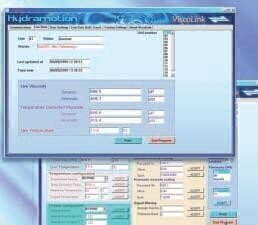Measurement and Testing
New Generation of Field-proven On-line Viscometer
Feb 18 2010
Hydramotion Ltd (UK) is pleased to announce a new generation of its field-proven XL7 on-line process viscometer. The latest model stores all instrument-specific data on the transducer, giving complete flexibility of installation. The accompanying VP550 readout unit has a clear, easy-toread display showing measured viscosity and viscosity corrected to a user-defined reference temperature.
Viscosity control is essential in many oilfield applications. For example, when blending fracturing fluid the successful suspension of proppant depends on the viscosity of the carrier fluid. If the viscosity is too low the proppant will come out of suspension and accumulate in the well bore, but if the viscosity is too high pumping efficiency and the distribution of proppant in the fractures will be affected. With an on-line viscometer such
as the Hydramotion XL7, the blending process can be streamlined and automated, thereby eliminating the need for time-consuming and unreliable offline measurement of grab samples while improving fracturing fluid quality and reducing the cost of disposing of excess carrier fluid.
Capable of measuring any fluid in any process, the high-performance XL7 is one of the most robust and adaptable viscometers on the market. Ready for use straight out of the box, the XL7 provides continuous real-time viscosity measurement with high resolution, excellent repeatability and virtually unlimited range. Any XL7 model can be supplied in an intrinsically safe version certified to IEC Ex ia IIC, suitable for all Hazardous Areas up to and including Zone 0 (explosive atmosphere continuously present), equivalent to Class 1 Division 1 Group A.
The XL7 can be installed directly on a pipeline or tank at any location and in any orientation with no need for any ancillary pipework. As the sensor always operates at the fluid temperature, there is no chance of error arising from localised cooling. With the diversity of oilfield applications very much in mind, the latest high-temperature HT2 model can be used at up to 450 degrees C (842 degrees F) without special cooling, while high-pressure
models are rated at 20,000 psi (1380 bar) or greater. Measurements are unaffected by variations in flow rate or by the presence of suspended solids or gases. The sensor naturally rejects typical plant vibration frequencies, which gives a very high output stability even in extremely noisy wellhead or refinery environments. With such a combination of toughness and resilience the XL7 is the viscometer of choice for any oil industry process, no matter how harsh or aggressive the measurement conditions.
The XL7 is factory-calibrated to certified viscosity standards traceable to NIST and requires no on-site calibration. The sensor is an all-welded construction which can be mounted at any location and in any orientation using any process fitting. Calibration is unaffected by installation or environment. As there are no moving parts, maintenance is negligible and no spares or accessories are required.
The VP550 readout unit can accept a range of inputs, including temperature, which can be shown in either Celsius (°C) or Fahrenheit (°F). The user can select from a range of standard viscosity units including centipoise (cP), pascal-seconds (Pa·s) or centistokes (cSt) as desired. Conversion to other units is also possible. User-friendly intuitive software offers rapid access to any function or parameter for configuring or updating the system. Menu navigation is quick and easy using the simple-to-operate keypad. No programming is required.
There are three user-selectable 4-20mA analogue outputs, all fully configurable, as well as an RS485 serial data link for remote viscosity monitoring and control. The optional USB output facilitates direct connection to a PC or laptop.
Simple to hook up and use, the combination of XL7 transducer and VP550 readout unit gives a reliable, easy-to-use and durable viscosity measurement system with an unbeatably low cost of ownership.
Digital Edition
PIN 25.4 Aug/Sept
September 2024
Analytical Instrumentation - Novel and Rapid LSC method for the analysis of biogenic carbon in fuels Measurement and Testing - Matrix evaluation on the Xplorer-V with Vectra autosampler accordi...
View all digital editions
Events
Nov 04 2024 Abu Dhabi, UAE
Nov 04 2024 Kigali, Rwanda
Nov 05 2024 Toronto, Canada
Nov 05 2024 Paris, France
Nov 12 2024 Cologne, Germany



















